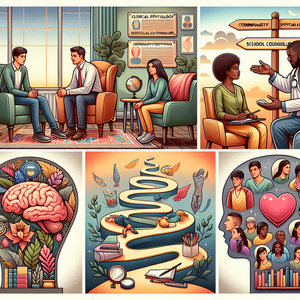
Embracing Change: 15 Inspiring Career Paths for Future Counselors
Transitioning into a career in therapy and counseling can be a thrilling yet challenging journey, especially for individuals pivoting from established careers in fields such as IT, human resources, or public relations. Many of those drawn to this profession are fueled by a sincere desire to uplift others. While pursuing a master’s degree in counseling or social work generally marks the beginning of this path, it demands a substantial commitment—often three years of rigorous study followed by practical internship experiences.
Job Summaries:
Licensed Professional Counselor (LPC):
- Licensed Professional Counselors play a crucial role in mental health care
- They offer assessments, treatment plans, and coping strategies for clients
- They help clients dealing with issues such as anxiety, depression, and relationship conflicts
- This position requires a master’s degree in counseling or a related area
- Supervised clinical hours are required
- A successful licensing exam is necessary
Marriage and Family Therapist (MFT):
- Marriage and Family Therapists focus on the dynamics within relationships.
- They address challenges like marital discord and parenting difficulties.
- Generally requiring a master’s degree in marriage and family therapy and state licensure.
- MFTs work closely with clients to cultivate healthier interactions.
Clinical Social Worker:
- Combining therapy with advocacy, Clinical Social Workers assess clients’ needs and connect them with vital community resources.
- Achieving this role requires a master’s degree in social work (MSW), clinical training, and licensure.
Substance Abuse Counselor:
- Specializing in addiction recovery
- Provide counseling, education, and family support to clients
- Typically requiring a bachelor’s degree in psychology or a related field
- Certification in substance abuse counseling
School Counselor:
- School Counselors are vital in educational settings.
- Aiding students' academic and emotional development.
- They offer individual and group counseling.
- Crisis intervention is provided.
- Assistance with academic and career planning is available.
Career Counselor:
- Career Counselors assist individuals in job exploration and transitions.
- They offer job search strategies and skills enhancement.
- A master’s degree in counseling or a related field is often necessary.
Health Coach:
- Health Coaches guide clients in achieving wellness goals and adopting healthier lifestyles.
- Certification from a recognized health coaching program is essential.
- Backgrounds in psychology or counseling can enhance effectiveness.
Life Coach:
- Life Coaches help clients realize personal and professional aspirations.
- They foster motivation and accountability.
- Formal certification is not always required.
- Training from a reputable program can enhance credibility.
Psychiatric Technician:
- Psychiatric Technicians support individuals with mental health issues or developmental disabilities.
- They aid with daily activities and monitor behavior.
- Typically requiring a high school diploma or associate degree in mental health.
Mental Health Advocate:
- Mental Health Advocates work to promote awareness and enact policy changes in the mental health arena.
- They educate and connect resources for those facing mental health challenges.
Rehabilitation Counselor:
- Rehabilitation Counselors assist individuals confronting physical, emotional, or mental disabilities in achieving personal and professional goals.
- A master’s degree in rehabilitation counseling or a related field is typically required.
Art or Music Therapist:
- Art and Music Therapists utilize creative modalities to help clients express themselves and address emotional difficulties.
- Usually requiring a master’s degree in art therapy or music therapy.
Play Therapist:
- Play Therapists specialize in working with children.
- They use play as a therapeutic medium to help children express emotions.
- A master’s degree in counseling or social work is required.
- Specialized training in play therapy is also required.
Crisis Intervention Specialist:
- Crisis Intervention Specialists provide immediate support to individuals in distress.
- This role often necessitates knowledge of mental health issues.
- Effective communication skills are essential.
- Certification in crisis intervention techniques may be required.
Telehealth Counselor:
- Telehealth Counselors provide remote therapy services.
- Using technology to connect with clients across various locations.
- A master’s degree in counseling is essential.
- Appropriate licensure is essential.
These diverse roles illustrate the myriad opportunities available for individuals contemplating a career in therapy or counseling. Whether you aim to become a licensed therapist or explore alternative avenues within the mental health field, numerous fulfilling paths await. As you navigate this career transition, it's crucial to recognize the emotional and financial challenges involved, leverage your existing skills, and prioritize self-care to prevent burnout.
Explore More Jobs

